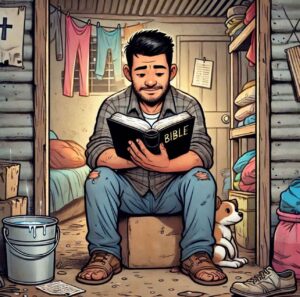Welcome Blessings!
(Tap 🔽 to see more topics!)


Fight poverty: it’s more than just a phrase; it’s a daily battle by millions who feel trapped in a cycle of hardship. Imagine feeling stuck in a hole you can’t climb out of, no matter how hard you try. That’s what poverty feels like for so many. It’s not just about having an empty wallet; it’s the weight of constant worry, the feeling of being trapped, and the crushing sense that things will never get better. It’s like a shadow that follows you, dimming your dreams and stealing your confidence.
But the thing is, that shadow doesn’t have to win. Even in the most challenging times, there’s a light that shines through, a source of strength and practical help that can guide us toward a brighter future. I’m talking about the power of God’s Word. It’s not just a book of stories; it’s a toolbox filled with real-life strategies for facing the challenges of poverty. We will unpack how faith, combined with real action and solid biblical principles, can be the key to unlocking a life free from financial hardship, not just for ourselves but for those around us. Let’s dig in and discover how we can turn hope into real change!
Poverty isn’t just about money, even though that’s a big part. It’s easy to look at someone struggling and think, ‘They just need a job,’ but the Bible paints a much bigger picture. It shows us that poverty can come from many places, some of which might surprise you.
Understanding where poverty comes from helps us better help people. We can’t just throw money at the problem and expect it to disappear. To make a difference, we must consider the whole person’s spirit, feelings, and mind.

God cares about people struggling with poverty. You see it all through the Bible. It’s not just a passing thought with Him; it’s a deep concern. He doesn’t just watch from a distance; He wants us to get involved and make a difference.
A good life isn’t just about having a lot of stuff. It’s about living with a purpose, trusting that God’s got our back, and helping others climb out of tough spots. It is about understanding that we are here to help each other.

Seek God’s Wisdom First
When money gets tight, panicking and jumping at the first solution is easy. But before you make any big moves with your finances, take a moment to talk to God about it. Seriously. It’s like asking for directions before you go on a road trip. You wouldn’t just start driving without a map, would you?
The Bible talks about this. Proverbs 3:5-6 says, ‘Trust in the Lord with all your heart and lean not on your understanding; in all your ways submit to him, and He will make your paths straight.’ What does that look like in real life? Before you sign any contracts, pray about it. When you’re tempted to make an impulse purchase, take a deep breath and ask for God’s wisdom. If you’re facing a tough financial decision, spend some time in prayer and reading the Bible.
It’s not about expecting God to solve all your problems magically but acknowledging He knows what’s best for you. It’s about getting that sense of peace and clarity from knowing you’re on the right track. It’s like having a trusted advisor who always has your best interests at heart.
Develop a Mindset of Abundance, Not Scarcity
It’s easy to feel like there’s never enough. You know, that gnawing worry that you’ll always be behind, that things will never change. That kind of thinking, a scarcity mindset,’ can hold us back. Sometimes, we’re stuck because we believe we’re stuck.
The Bible has something powerful to say about this. Proverbs 23:7 says, ‘As a person thinks in their heart, so they are.’ That’s pretty straightforward. What we believe deep down shapes our reality. So, how do we flip that switch?
It’s about shifting from that ‘not enough’ feeling to a mindset of abundance. Not an abundance of things, necessarily, but an abundance of faith in God’s provision. It’s about:
It’s not about ignoring the challenges; it’s about changing your perspective. When you believe things can change, you’re already one step closer to making it happen.
Work Diligently and Ethically
Hard work is a cornerstone of building a better life. The Bible speaks to this directly: ‘Careful planning and hard work lead to prosperity, but hasty shortcuts lead to poverty.’ (Proverbs 21:5).
It’s easy to get discouraged when you’re struggling financially, but focusing on doing good work and doing it ethically can open up opportunities you might not expect. It’s about taking pride in what you do, no matter what it is.
Be a Good Steward of Resources
We all have something to work with, whether a little or a lot. It is like being trusted with tools – how we use them is up to us. The Bible talks about this a lot, especially in its stories. It’s not just about money but everything we’ve got: time, skills, and energy.
It’s about being responsible. You wouldn’t leave a borrowed tool out in the rain, would you? The same goes for what we’ve been given. We’re supposed to take care of it, use it wisely, and make the most of it. It’s not always easy, but it makes a big difference in the long run. It’s about being a good steward, a fancy way of saying taking good care of what you’ve got.
Avoid Debt and Live Within Your Means
Debt can feel like a heavyweight, constantly pulling you down. It’s an everyday struggle, and many of us have been there. The Bible puts it bluntly: debt can put you in a tough spot. So, how do we overcome this?
Needs vs. Wants
Avoiding Unnecessary Debt
Living Within Your Means
It’s not always easy, and it takes discipline. But taking control of your finances can bring a sense of freedom and peace of mind. It’s about making smart choices today for a more secure tomorrow.
Give Generously
Thinking about giving when your wallet is thin might feel strange. You might wonder, ‘How can I give when I barely have enough for myself?’ But a truth often surprises people: generosity can open doors you didn’t even know existed. It’s about more than just money; it’s about a shift in your mindset.
Think of it like planting a seed. You might not see the fruit immediately, but you trust that something will grow. The Bible says, ‘Give, and it will be given to you’ (Luke 6:38). That’s not just a nice saying; it’s a principle that’s been proven time and again.
Finding ways to give back can bring unexpected blessings and hope, even when facing financial challenges. It’s about trusting that there’s still a way to impact even when things are tight positively.
Surround Yourself with the Right People
People you hang out with matter, especially when trying to make changes in your life. It’s just a simple truth. You know how it goes: if you spend time with people constantly complaining, you also start to feel more negative. The same goes for money.
The Bible says, ‘Spend time with the wise, and you’ll become wise. Hang out with fools, and you’ll get into trouble.’ (Proverbs 13:20, CEV)
It’s not about forgetting your old friends but about ensuring you have people who lift and inspire you to improve. Maybe that means joining a church group, volunteering with a local charity, or spending more time with those people you already know who have their lives together. You’d be surprised how much of a difference it can make.
Seek Education and Skill Development
Knowledge really can change everything. It’s not just a saying; it’s something we see play out in real life all the time. Learning a new skill or understanding how money works opens doors you didn’t even know existed.
This idea is echoed in the Bible in Hosea 4:6, which reminds us that a lack of knowledge can hold us back. That’s why education and skill development are so crucial. They’re not just about getting a piece of paper; they’re about equipping yourself with the tools to build a better future.
It’s about taking that first step, whether enrolling in a local class, taking an online course, or reading a book. Every bit of knowledge you gain is a step towards a brighter future.
Trust God’s Timing and Plan
It’s easy to want a quick fix, especially when dealing with something as challenging as poverty. You know, you wish things would change overnight. But life rarely works that way. Think about Joseph in the Bible. He didn’t go from being thrown into a pit by his brothers to running Egypt in a day. It was years—years—of slavery, unfair imprisonment, and waiting.
Joseph’s Journey:
That journey wasn’t a mistake. It was God’s way of preparing him. And honestly, it’s often how God works with us, too. We might not understand the delays or the setbacks, but there’s a reason for them. It’s about building character, learning lessons, and preparing for what’s next.
So, instead of getting frustrated with the pace of things, try to trust the process. It’s about believing that God is still working behind the scenes, even when nothing changes. He’s got a plan, and even if you can’t see it yet, it’s a good one. It’s about trusting that the hard times are not wasted times. They are the times that prepare you for more incredible things.
Speak and Act on God’s Promises
It’s one thing to believe something and another to live it. When discussing fighting poverty, it’s not just about wishing things were different. It’s about combining what we think with what we do.
Your words have power. If you constantly say, ‘I’m always broke,’ or ‘Things will never change,’ that starts to shape your reality. But what if you started saying something different? What if you began to speak the truth based on what God has promised?
It’s not about magic words but shifting your mindset and reminding yourself of God’s faithfulness.
But here’s the crucial part: words alone aren’t enough. You’ve got to back them up with action. It’s like planting a seed. You can say, ‘This seed will grow,’ all day long, but if you don’t water it, it won’t amount to much.
So, what does this look like in real life?
It’s about taking practical steps that align with your beliefs about showing God that you’re not just listening but willing to participate in the process. It’s about combining faith and action because that’s where real change happens.
Ultimately, overcoming poverty isn’t just about working harder; it’s about partnering with God’s wisdom and realizing faith and finances go hand-in-hand. Remember, your mindset matters, shifting from lack to faith, and God’s plan is more significant than your struggles; your past doesn’t define your future. But belief alone isn’t enough; take action and put your faith to work. Wherever you are financially, God’s Word offers strategies and strength. So, pick one thing we discussed, apply it, share this message, and keep moving forward- your breakthrough is on the way, and I’m cheering you on.
We have a budding YouTube channel, Light Up Your Journey, that you would love to join. You can discover Bible Verses or Scriptures videos that will help boost your mood and inspire you. Remember, the best way to find inspiration is to seek it out. Voila! Until next time!